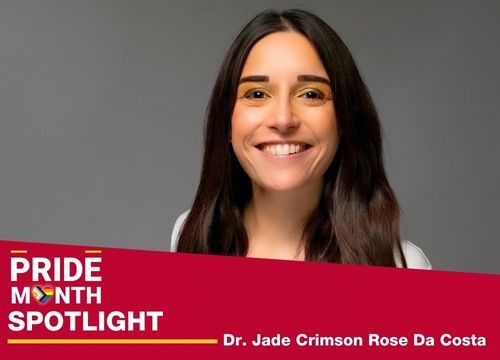Pride Month Spotlight: Uniting Gender, Sexuality, Decolonization, Anti-Racism

Dr. Jade Crimson Rose Da Costa, born to a Goan Indian refugee from Uganda and an English-Hungarian factory worker, embodies a multifaceted identity as a gender nonbinary queer woman of color. A scholar, community organizer, knowledge mobilizer, and creative writer, Dr. Da Costa currently serves as a Banting Postdoctoral Fellow at the University of Guelph. Da Costa holds a PhD in Sociology from York University, and their body of work focuses on topics related to anti-racism, decolonization, and intersectionality. Their advocacy work includes founding Erotic Pedagogy, an Instagram page for decolonizing sexual education, and co-founding The People’s Pantry, a mutual aid project addressing food insecurity. Their dissertation, “From Racial Hauntings to Wondrous Echoes: Towards a Collective Memory of HIV/AIDS Resistance”, aims to preserve the legacies of QTBIPOC activists.
As a Banting Postdoctoral Fellow, Da Costa's research focuses food insecurity among racialized and Indigenous Ontarians in the COVID-19 era. Utilizing digital methods, they are working in partnership with the Re•Vision Centre for Art and Social Justice and the Community Engaged Scholarship Institute at the University of Guelph. They are also the founder and Editor-in-Chief of New Sociology: Journal of Critical Praxis, a platform for marginalized voices in academia. Their work in community-engaged pedagogy and critical health studies reflects their deep commitment to social justice and intersectional advocacy.
What motivates you to explore specific fields or areas of interest?
All my work is motivated by my lived experiences as a person from diverse communities and of many identities, many of which marginalized, and my ethical commitment to end white supremacy and the subjugation of all living beings, including the earth.
What are some common misconceptions about your area of research / study?
That I am a “gender and sexuality” scholar just because my work often focuses on gender, sex, and sexuality. I am a researcher and organizer in these areas, but my true dedication lies in decolonialization, anti-racism, and intersectionality. This includes believing in a free Palestine, Congo, Tigray, Sudan and Haiti, and standing against genocide in all forms. Whether here on Turtle Island or across the world’s many oceans, I consider gender and sexuality to be optics or extensions of my decolonial inquiry, not my primary focus.
What challenges do you face when engaging with your work, and how can they be addressed?
There is a lack of institutional support for both community-based research and grassroots organizing. More funding and resources, as well as focus and value, must be placed on praxis-oriented work and collective movements in academia and in wider society.
What would you like people to know about what you do?
Everything I do, I try to do for the people.